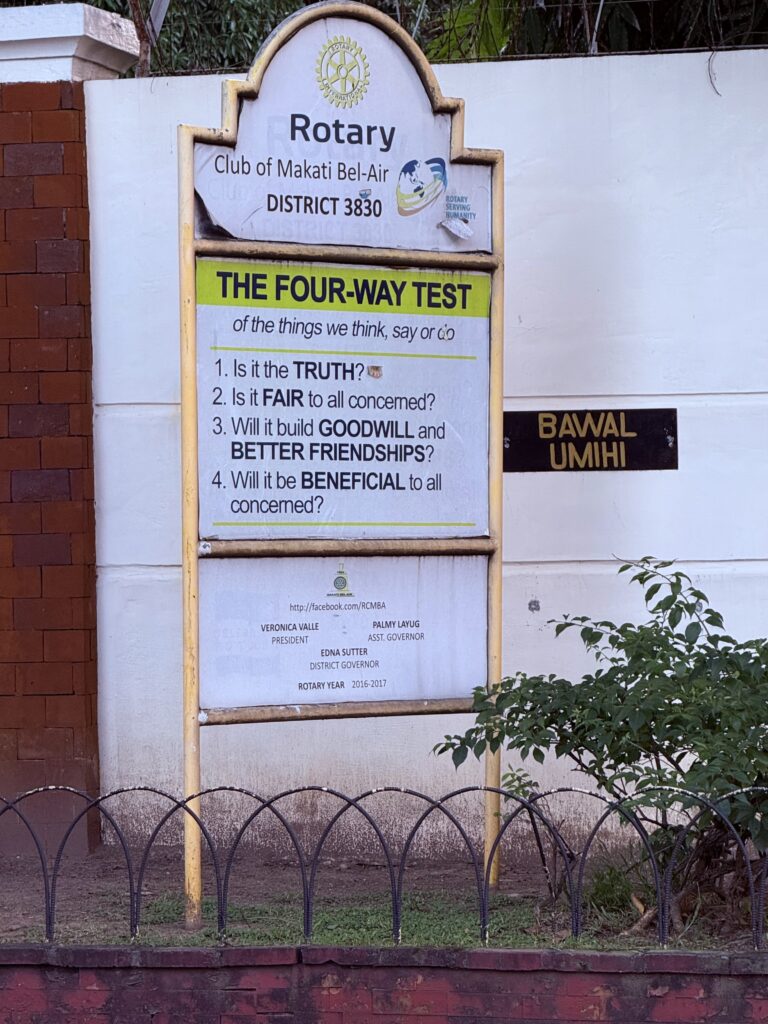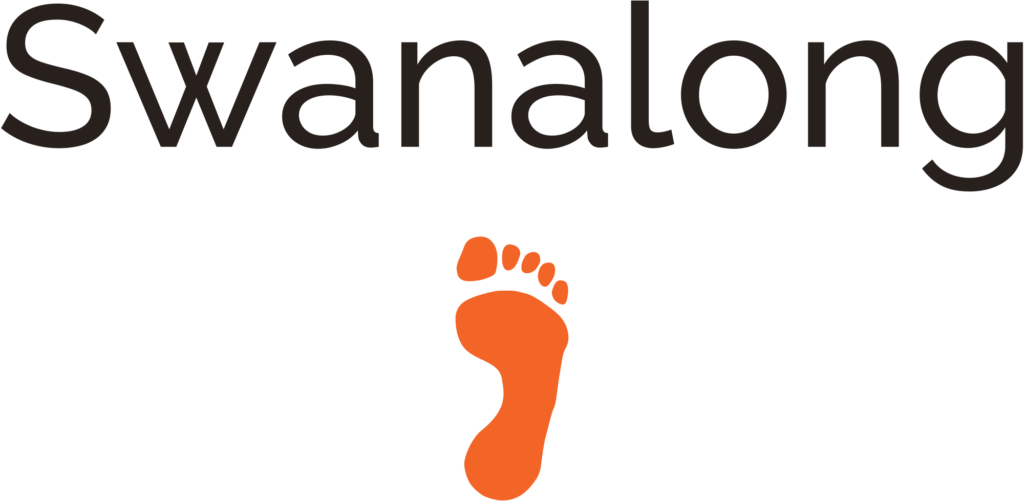I was walking back from the laundry in Makati, Manila when I spotted a sign from the Rotary Club. It read:
“The Four-Way Test of the things we think, say, or do.”
- Is it the truth?
- Is it fair to all concerned?
- Will it build goodwill and better friendships?
- Will it be beneficial to all concerned?
It struck me how relevant these principles are to how we use free speech. Imagine if everyone applied this four-way test before speaking—how different would our public discourse be? Especially in a world dominated by social media, where free speech is often a battlefield rather than a dialogue.

Giving Morons a Voice
Whether it was the recent U.S. elections or Joe Rogan’s interview with Elon Musk, something has sparked my thoughts on free speech, particularly on social media. Musk often portrays himself as a champion of free speech, but what does that really mean today? Do people truly understand what freedom of speech entails—or the responsibility it demands?
Freedom is universally cherished, but let’s be honest: true freedom is elusive. I’m a bit of a determinist. Our lives are shaped by upbringing, genetics, and social forces. Even our so-called “freedom” to pursue desires is often limited—many things I’d like to do are financially or physically out of reach.
Speech is no different. People love to say, “It’s a free country; I can say what I like,” but that overlooks crucial factors.
First, are you even qualified to speak on the topic? Are you sharing verified facts or spreading uninformed opinions? And most importantly, is your speech causing harm? What truly concerns me is how often people wield free speech without understanding that it comes with a duty to use it wisely. Let’s be blunt—not everyone is wise.
The Social Contract of Speech
On the surface, it’s easy to support the idea that everyone should have the right to express themselves. But in practice, free speech isn’t so simple. We live within a society governed by a social contract—unspoken agreements about respect and responsibility.
Frankly, I’m not sure I want everyone to have unrestricted freedom to say whatever they want. That might sound authoritarian, but hear me out. Some people use their freedom responsibly, fostering thoughtful dialogue. Others weaponise speech to spread hate or harm. And let’s face it—there’s a part of all of us that craves validation. We want to be right, to have our views dominate. It’s human nature, but it complicates the idea of open, constructive discourse.
Divergent opinions are healthy, but when they escalate into social conflict or misinformation, they create serious problems. It’s a delicate balance: you’re criticised if you advocate for limits and equally criticised if you defend unrestricted speech.
Elon Musk and the Illusion of “Absolute” Free Speech
Figures like Elon Musk make this conversation even more complex. As a self-proclaimed “free speech absolutist,” Musk owns X (formerly Twitter), one of the largest platforms for public discourse. But Musk’s version of free speech is far from absolute.
Take his use of algorithms. Musk reportedly ensures his posts are prioritized on users’ feeds. If true, this isn’t free speech—it’s manipulated speech. Participating in a conversation is one thing, but controlling it through platform mechanics is something else entirely. When someone with Musk’s influence decides who gets heard, can we truly call it freedom of speech?
What Does Free Speech Actually Mean?
At its core, free speech is about the right to express oneself without obstruction. But speech doesn’t exist in a vacuum. Words carry consequences, often rippling far beyond the speaker’s intent.
Unchecked speech can disseminate misinformation, fuel hatred, or incite violence. So, should speech remain free when it carries such risks?
Free speech is crucial for encouraging innovation and diversity of thought. But left unchecked, it can destabilise society. That’s why many nations embrace “regulated freedom,” permitting broad expression but imposing boundaries to protect public welfare.
Yet, some limits feel ambiguous. Consider the Nazi salute, banned in many countries for its hateful implications. While the rationale is clear, do we really need laws to enforce this? Sensible people already recognise its abhorrence.
When I was a kid playing war games, someone always played the Nazis—the bad guys. We all understood why they were the villains without needing an explanation. So why do we now need laws to affirm what should be common sense?
Perhaps the core issue lies in society’s dwindling trust in its ability to self-regulate. Instead of fostering accountability and mutual respect, we’ve turned to legislation. But laws alone can’t solve everything. Compliance driven by fear of punishment doesn’t change hearts or minds—it just creates avoidance. Does that really make us a better society? I’m not convinced.
The Paradox of Free Speech
The irony of free speech is that it’s often used to silence others. On social media, I see it constantly: people loudly champion their right to speak but ridicule or dismiss anyone who disagrees with them. It’s not about dialogue; it’s about dominance.
And let’s not forget how platforms like X manipulate what we see. Algorithms amplify certain voices—often the loudest or most controversial—while burying others. Free speech assumes a level playing field, but the reality is far from equal.
Even the philosophy behind free speech rests on a shaky assumption: that people will use it responsibly. Thinkers like John Stuart Mill championed free discourse as a path to truth, but even Mill acknowledged the dangers of malicious speech. In reality, free speech often amplifies outrage and misinformation rather than fostering understanding.
And when it comes to “truth,” how often do we even agree on what’s true? Sometimes, there is no absolute truth—only perspectives. The truth is out there somewhere, and the risk is that the freedom to say what you want, if unchecked, can lead millions of gullible people down a very shady path.
So, Where Do We Go From Here?
Free speech isn’t perfect, and it never has been. It’s a principle that requires balance—between expression and accountability, individual rights and collective welfare. The question isn’t just whether you can say something; it’s whether you should.
We need to rethink what free speech means in practice. It’s not about having the loudest voice or the most controversial take. It’s about engaging in a conversation—one where listening is as important as speaking.
Because if we’re not willing to hear each other out, what’s the point of free speech? If we use it to harm instead of help, or to shout others down rather than lift them up, we’re not defending freedom. We’re just making noise.
Thought-Provoking Questions
- Can free speech truly exist in a world where algorithms decide who gets heard?
- Is it possible to balance freedom of expression with the responsibility to prevent harm?
- Should laws regulate all offensive speech, or can society be trusted to draw its own lines?
- If free speech is meant to promote dialogue, why are so many people unwilling to listen?
These questions don’t have easy answers. But maybe the point isn’t to find a perfect solution. Maybe it’s to keep asking, to keep challenging ourselves—and each other—to do better. Because in the end, free speech isn’t just a right. It’s a responsibility.

